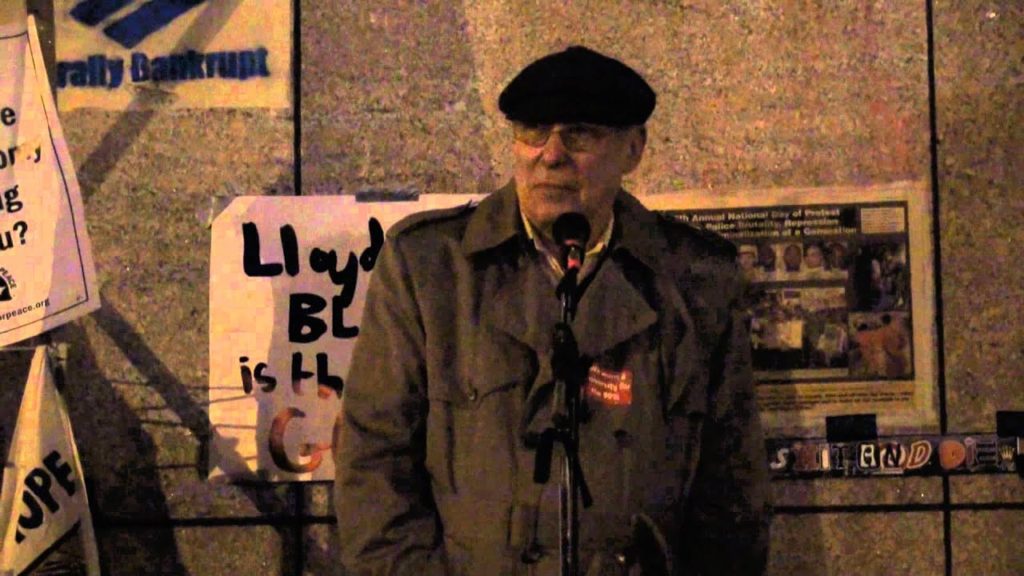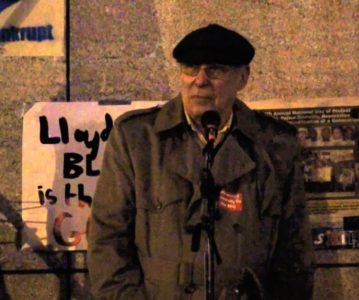Gus Breslauer commemorates Noel Ignatiev, a communist and race abolitionist who died this month while leaving behind a legacy that should serve as an inspiration to all dedicated to a world beyond exploitation and oppression.

On Saturday, November 9th, 2019, we received the unfortunate news that Noel Ignatiev has passed away. Sources state he left us in comfort and surrounded by close family. We offer our deepest condolences to his family and all his comrades. He was a father, teacher, organizer, editor, leader, fisherman, comrade, and friend. His passion for life lives on in many.
Remembering Noel is no simple or easy task to put into words. He was, in his own words, a person who “tried to lead a life not allowing himself to be defined by others”. I will do my best to summarize what Noel meant to me and hopefully offer some small testament to the very big person he was. Many generations are joining us in mourning, from the people who read Race Traitor zines in the 1990s and found them on the infoshop tables at punk shows, to the people who took to the streets during the Ferguson wave and Occupy, to the people who struggled against bosses alongside him in the 1970s. All of us agree that Noel was immensely influential in our political development and had a huge impact on our lives.
He was a scathing polemicist and deeply critical thinker. Though this can describe many on the left, Noel was a cut above. He did not care for cheap popularity or even his own certitude in the eyes of others, only pushing towards new forms of reasoning and criticism, most of all invoking action. Noel was called dangerous and was vilified for daring to challenge the white race and calling on others to do so. This never bothered him, and although he did try to clarify, Noel was always more concerned with being heard and understood than being agreed with. This kind of steadfast dedication to ruthless criticism is the hallmark of a true revolutionary.
He also was the embodiment of what General Baker described as “our task as revolutionaries … to turn thinkers into fighters and fighters into thinkers”. Noel was a dedicated workplace militant and organizer in the Chicago steel mills during the 1970s, at a time when most of the revolutionaries of his day had turned towards anything but class struggle, on an idealistic quest for orthodoxy. Noel was a necessary voice of criticism and skepticism for the labor movement, never seeing unions as merely neutral institutions, and warned of their capacity to preclude struggling workers from their goals.
Noel derived many of his thoughts on racial oppression from these experiences and saw in the demands of black workers a way out of whiteness for white workers. Noel was especially concerned with trying to understand the essence of race and racial oppression, and its overcoming. Distinctly, Noel wanted to challenge the existence of the white race: not as individuals, but as the system which raised one section of humanity above all others. He questioned the “unite and fight” strategies that cheapened and shortcutted the much-needed analysis of race and its impact on class struggle.
After the breakup of the Sojourner Truth Organization, Noel was an advisor to many revolutionary organizations and mentor to many individuals, and in this role was infinitely valuable. He was among the few leftovers of the New Communist Movement who remained truly dedicated to revolutionary politics. However, Noel’s gift was also his talent as a guide and clarifier that did not also seek to directly impose his will; all he wanted from the younger generation was for us to think for ourselves. It was in this capacity that I first came to know Noel, as an advisor to a group of younger militants, from whom I learned a great deal. I was a bit starstruck when he agreed to read an early draft of mine. Today in the US, across many different traditions, texts like “Black Worker, White Worker” have served as almost required readings. Noel had a way of leaving doors open and deferring questions to the course of the struggle, while still being incredibly instructive and influencing people towards action.
He was an indispensable historian and rigorous scholar. When I was fortunate enough to finally meet Noel, I remarked that I was able to really influence my mother’s opinion regarding Palestine because of a talk he had given. I had to thank him for that before anything; my mother and I come from a family of devoted Zionists. He once remarked that “Zionism, Anti-Semitism and the People of Palestine” was the one thing he knew he would never change a word of. Noel really wanted to get underneath the process by which the Palestinian people became dispossessed under a deadly apartheid regime. Because of the lengths he went to understand this process, Noel gave a clear and convincing vision for a simple and moderate program to overcome national oppression and the apartheid state in Zionist-ruled Palestine.
One thing that is remembered by many is that, beneath his gift for polemics, debate, and asking the tough questions that make a room get silent and loud again, Noel was very kind and gentle. He cherished and made as much room as possible for the younger people in his life. Many of us returned that to him, because we always had a feeling that Noel had never and would never sell us out, and we were right.
Noel was fascinated with stories about everyday life and everyday people, and what these had to tell us about the big picture, and he had so many; from his shopfloor days to the pages of the Hard Crackers Journal, he wanted to catalog them all. He once remarked in issue five of Hard Crackers “When I am on the road, I eat at Waffle House; call it research”. There is a certain wholesome trait to the stories Noel related to us, they often contained something indescribably human.
Rest in power, Noel Ignatiev. Treason to whiteness is loyalty to humanity, refuse to be white!




